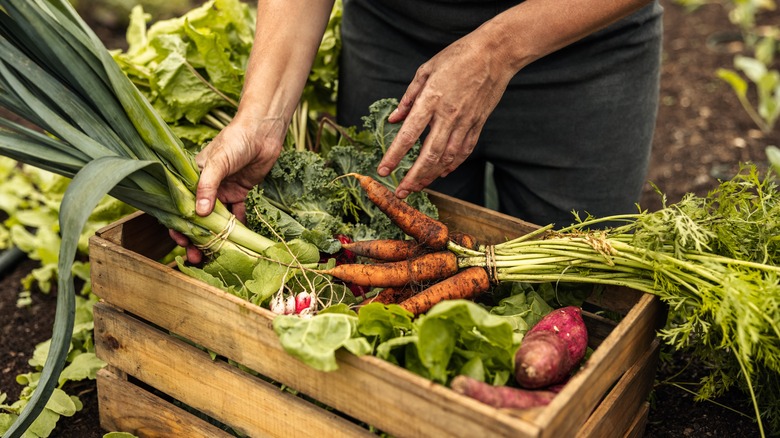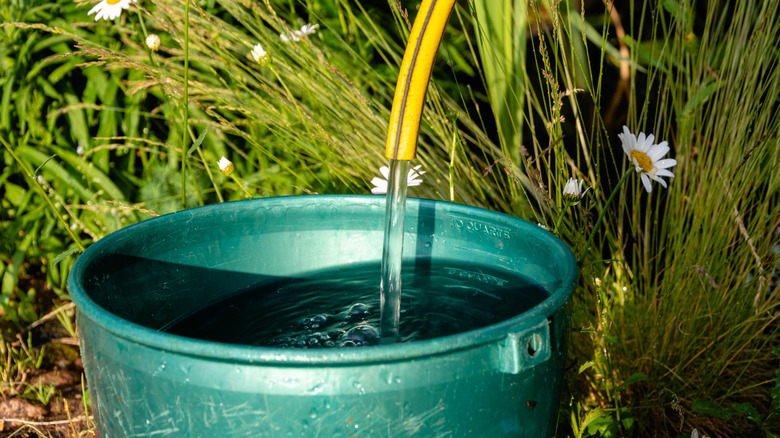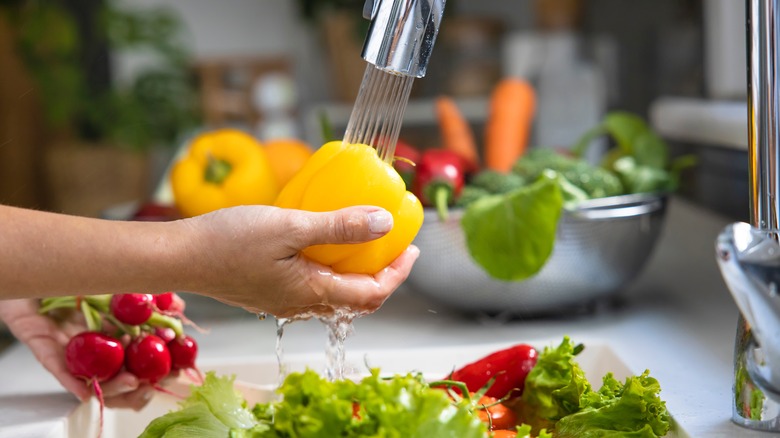The Most Efficient Way To Clean Your Garden Veggies Before Bringing Them Inside
Growing vegetables in your garden would provide you with endless ingredients to use in your daily meals. You'd also save some money growing produce in your yard instead of buying from the grocery store, especially if you planted some fast-growing vegetables. While they offer many nutritional benefits, washing and prepping your veggies before cooking with them is crucial. Instead of eating dirty vegetables with harmful pesticides or germs from the garden, washing them in three buckets and then using a salad spinner to dry is the most efficient way to ensure they're thoroughly clean.
According to the Centers for Disease Control and Prevention (CDC), raw, dirty veggies can contain harmful germs like E. coli, Salmonella, and Listeria that are unsafe to consume. These can cause you and your family to get sick, which can take a couple of weeks to recover from. All fruits and vegetables should be washed appropriately, even if some are going to be peeled. The germs on the peel or skin's surface can get inside the vegetables when you cut into them, so washing them before use is ideal. We've seen many TikTok videos that show various ways to clean vegetables and fruit with soap, vinegar, or baking soda, but the CDC claims you don't need anything else except fresh water.
Fill three buckets of water to wash your veggies
Even if you're a careful gardener who uses household items to make natural fertilizers instead of using herbicides, pesticides, or strong fertilizers, washing your vegetables is still essential. You might be doing everything right, but you never know what small bugs are passing through your garden. The wind can also blow debris into your space that you don't want all over your vegetables. You should enjoy eating your produce without worrying about them tasting like dirt or hoping that insects don't crawl out of them.
Thoroughly cleaning your veggies is easy peasy. You'll need three buckets and one salad spinner. Fill each bucket to the brim with drinking water and place them next to each other. Dump your harvested vegetables into the first bucket, swirl them around a few times, and take them out. Give your veggies a good shake and dunk them into the second bucket of water. Look at the first bucket as your veggies rest in the second one. If you notice a lot of mud or soil in the first bucket, give your vegetables one final rinse in the third bucket. After their final rinse, place them in the salad spinner to remove all the water. However, if the first bucket has a limited amount of mud or soil, your veggies won't need a third rinse; instead, they can go straight to the salad spinner.
Which vegetables should be cleaned with this method?
While this method can be used for all vegetables, it's most beneficial for certain types. All root vegetables that grow in the ground like beets, carrots, onions, and potatoes should be thoroughly washed with the three-bucket cleaning method. This is also the case with salad greens like lettuce or spinach. However, some vegetables that grow above the ground like cucumbers and peppers can be quickly rinsed right before consumption instead. Vegetables that grow above ground sometimes get a protective bloom, a thin, gray coating on the skin. The protective bloom helps prevent bacteria and insects from invading the vegetables. In addition, the coating keeps the produce fresh for longer. If you washed them in buckets, this layer could be removed. Instead, take them into your kitchen unwashed so they can stay fresh as long as possible with the coating on them until you decide to enjoy them, then rinse before cooking.
On the other hand, when buying produce from the grocery store, there are a few things to consider. While you should still wash unpackaged produce at home, you can decide whether to wash packaged items. The CDC says that packaged produce with a pre-washed label doesn't have to be washed at home. However, if you feel skeptical about how manufacturers handle their produce, giving them a quick rinse wouldn't be a terrible idea. Nonetheless, a good rule to follow when consuming any vegetable is to wash it before eating.


